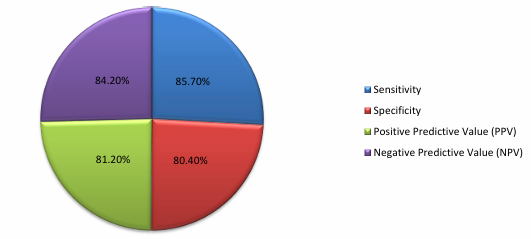Association of Periodontal Disease with Serum C-Reactive Protein Levels in Systemically Healthy Individuals A Case-Control Study
Main Article Content
Abstract
Introduction: In addition to harming the gums and teeth, periodontal disease may also result in inflammation in other body areas. Finding out whether there is a connection between periodontal disease and CRP in healthy individuals' blood was the goal.
Methodology: A total of 101 patients were included in this case-control research conducted at Khyber College of Dentistry (KCD) Peshawar, 50 of whom had moderate to severe periodontitis and 51 of whom were in excellent dental health. The clinician used BOP, CAL, and PPD to evaluate periodontal health. An ELISA test was used to determine the serum's CRP levels. Chi-square tests, Pearson's correlation, and t-tests for independent samples were used to examine the data.
Results: The CRP levels of study participants in the case group were significantly higher (12.4 ± 4.6 mg/L) than those in the control group (3.1 ± 1.2 mg/L). There was a direct [positive] correlation between CRP and CAL (r = 0.75, p < 0.001) as well as PPD (r = 0.82, p < 0.001). As a test for periodontitis, CRP has 80.4% specificity and an 85.7% sensitivity. This implies that periodontal disease may be detected by CRP.
Conclusion: CRP is regarded as a biomarker for detecting and monitoring periodontal disease and has a good correlation with periodontitis. To confirm the findings, this research must be conducted again with a bigger sample size and a longer study design.
Article Details
Section

This work is licensed under a Creative Commons Attribution-NonCommercial 4.0 International License.
How to Cite
References
Martínez-García M, Hernández-Lemus E. Periodontal Inflammation and Systemic Diseases: An Overview. Front Physiol. 2021 Oct 27;12:709438. doi: 10.3389/fphys.2021.709438.
Sirin DA, Ozcelik F, Uzun C, Ersahan S, Yesilbas S. Association between C-reactive protein, neutrophil to lymphocyte ratio and the burden of apical periodontitis: a case-control study. ActaOdontologicaScandinavica. 2019 Feb 17;77(2):142-9.
Esteves-Lima RP, Reis CS, Santirocchi-Júnior F, Abreu LG, Costa FO. Association between periodontitis and serum c-reactive protein levels. Journal of clinical and experimental dentistry. 2020 Sep 1;12(9):e838.
MoradiHaghgoo J, Torkzaban P, Farhadian M, MoosaviSedeh SA. Association between the severity of periodontitis, COVID-19, C-reactive protein and interleukin-6 levels in hospitalized patients: a case‒control study. BMC Oral Health. 2023 Aug 11;23(1):556.
Machado V, Botelho J, Escalda C, Hussain SB, Luthra S, Mascarenhas P, Orlandi M, Mendes JJ, D’Aiuto F. Serum C-reactive protein and periodontitis: a systematic review and meta-analysis. Frontiers in immunology. 2021 Jul 28;12:706432.
Wojtkowska A, Zapolski T, Wysokińska-Miszczuk J, Wysokiński AP. The inflammation link between periodontal disease and coronary atherosclerosis in patients with acute coronary syndromes: case–control study. BMC Oral Health. 2021 Dec;21:1-7.
Leira Y, Carballo Á, Orlandi M, Aldrey JM, Pías‐Peleteiro JM, Moreno F, Vázquez‐Vázquez L, Campos F, D’Aiuto F, Castillo J, Sobrino T. Periodontitis and systemic markers of neurodegeneration: A case–control study. Journal of Clinical Periodontology. 2020 May;47(5):561-71.
Sharma H. C-reactive protein levels in patients with periodontal disease: A case control study.
Jain R, Kudva P. Clinico-biochemical evaluation of relationship between periodontitis and Creactive protein: A case control study. Journal of Advanced Medical and Dental Sciences Research. 2021 Mar 1;9(3):11-6.
Rodríguez-Lozano B, González-Febles J, Garnier-Rodríguez JL, Dadlani S, Bustabad-Reyes S, Sanz M, Sánchez-Alonso F, Sánchez-Piedra C, González-Dávila E, Díaz-González F. Association between severity of periodontitis and clinical activity in rheumatoid arthritis patients: a case–control study. Arthritis research & therapy. 2019 Dec;21:1-2.
Mohammed SM, Hasan AS, Al-Hindy HA, Mousa MJ. C-reactive protein is associated with the severity of periodontal disease-an observational study among acute myocardial infarction patients. Sys Rev Pharm. 2020 Oct 1;11(10):252-7.
Tonguç MÖ, Öztürk C, Polat G, Bobuşoğlu O, Tek SA, Taşdelen B, Ünal S. Investigation of the relationship between periodontal and systemic inflammation in children with Sickle Cell Disease: A case-control study. Cytokine. 2022 Jan 1;149:155724.
Said KN, Al-Momani AM, Almaseeh JA, Marouf N, Shatta A, Al-Abdulla J, Alaji S, Daas H, Tharupeedikayil SS, Chinta VR, Hssain AA. Association of periodontal therapy, with inflammatory biomarkers and complications in COVID-19 patients: a case control study. Clinical Oral Investigations. 2022 Nov;26(11):6721-32.
Marouf N, Cai W, Said KN, Daas H, Diab H, Chinta VR, Hssain AA, Nicolau B, Sanz M, Tamimi F. Association between periodontitis and severity of COVID‐19 infection: A case–control study. Journal of clinical periodontology. 2021 Apr;48(4):483-91.
Lyra P, Botelho J, Machado V, Rota S, Walker R, Staunton J, Proença L, Chaudhuri KR, Mendes JJ. Self-reported periodontitis and C-reactive protein in Parkinson’s disease: a cross-sectional study of two American cohorts. npj Parkinson's Disease. 2022 Apr 13;8(1):40.
Daltaban Ö, Enginar AÜ, Üstün K, Hatipoğlu M, Kaçar C, Tuncer T. Evaluating the relationship between ankylosing spondylitis and periodontal disease: a case–control study. Clinical oral investigations. 2023 Jan;27(1):411-20.
Cruz-Ávila J, Hernández-Pérez E, González-González R, Bologna-Molina R, Molina-Frechero N. Periodontal disease in obese patients; Interleukin-6 and C-Reactive protein study: A systematic review. Dentistry Journal. 2022 Nov 29;10(12):225.
Sari A, Dikmen NK, Nibali L. Association between periodontal diseases and COVID-19 infection: a case–control study with a longitudinal arm. Odontology. 2023 Oct;111(4):1009-17.
